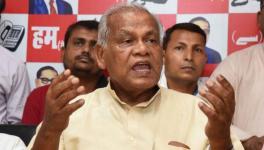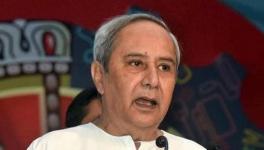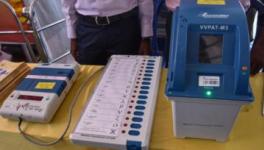Fear of Hindi Imposition Rises in Tamil Nadu; Opposition Parties Slam Modi Govt

Tamil Nadu being home to major anti-Hindi imposition struggles twice, first during 1937-40 and then in 1965, the present backlashes and opposition to the moves to impose Hindi is hardly a surprise.
The pace of the Bharatiya Janata Party (BJP) in imposing Hindi has been criticised for threatening the existence of regional languages. The central government and the party seem to follow the Rashtriya Swayamsevak Sangh’s (RSS) long-advocated policy of ‘One Nation, One Language’. Given the preference to Hindi, including the allocation of funds for its development, the federal set up of the country is also put under test.
The political parties and people’s representatives from the state have raised their concerns over the Union government continuing to put aside regional languages by trying to promote Hindi as the link language.
Also Read: Hindi Imposition and the Impending Death of Regional Languages
The official reply from Union ministers in Hindi to the Members of Parliament (MP) from Tamil Nadu and condolence message in Hindi to Chief Minister Edappadi K Palanisawmi have further aggravated the sentiments against the BJP government with regards to use of Hindi.
The recent introduction of 15 minutes Sanskrit news bulletin in the regional channel ‘DD Podhigai’ of the Doordarshan has only aggravated the concerns among people. The accusation of neglecting Tamil, a classical language, is also being raised.
UNION MINISTER REPLIES IN HINDI TO TN MP
The past few months saw repeated instances of Hindi being made obligatory or Tamil being neglected by the Union government and the ministers. Recently, on November 9, Madurai MP S Venkatesan of the Communist Party of India (Marxist) [CPI(M)] received a reply in Hindi to his letter from Union minister for Home Affairs, Nityanand Rai. The MP had written a letter to the Home Ministry regarding the necessity of examination centres in Tamil Nadu and Puducherry for CRPF paramedical staff recruitment.
The letter received by the MP’s office did not carry a English translation, as mandated by the Official Languages (Use for Official Purposes of the Union) Rules, 1976. The section titled ‘Communications to States etc. other than to Central Government offices’ states that “Communications from a Central Government office to State or Union Territory in Region "C" or to any office (not being a Central Government office) or person in such State shall be in English.”
Venkatesan referred to this clause of the rules and termed the reply in Hindi from the Union minister as against the procedure. He has also filed a public interest litigation (PIL) in the Madurai Bench of the Madras High Court seeking communication in English between the Union and the state. The Union government has been asked by the court to respond to this PIL.
Rajya Sabha member of the Dravida Munnetra Kazhagam (DMK), P Wilson has also reportedly received a communication in Hindi.
CONDOLENCE MESSAGE FROM HOME MINISTER IN HINDI
Union Home Minister Amit Shah too broke the rules when he wrote a condolence message in Hindi to mourn the death of CM Edappadi K Palaniswami’s mother in October. The letter was condemned by the leaders of the state as no such precedence had been set before.
The leader of Marumalarchi Dravida Munnetra Kazhagam (MDMK) and the Rajya Sabha MP Vaiko ridiculed the Home Minister for the condolence message in Hindi.
In September, a GST Commissioner alleged that he was posted in the Hindi Cell, though he did not know the language.
An uproar was created after AYUSH Ministry secretary Rajesh Kotecha allegedly asked those who could not understand Hindi to leave the virtual meeting for AYUSH and naturopathy physicians in August this year.
The three-language policy recommended in the National Education Policy (NEP) received the biggest opposition from Tamil Nadu. The state has been following the two-language policy (Tamil and English) and after a strong protest, the state government announced that it will not compromise on the existing policy.
NEWS BULLETIN IN SANSKRIT
The Prasar Bharati, the country’s public broadcaster, has introduced a Sanskrit news bulletin in the regional channels of Doordarshan, including the DD Podhigai in Tamil Nadu. The Prasar Bharati has directed telecasting of the daily news bulletins and the weekly bulletin in all regional channels as well.
The priority given to Sanskrit, mother tongue of less than 25,000 people across the country as per the PLSI report, has raised serious concerns. Thol Thirumavalavan, MP and leader of the Viduthalai Chiruthaigal Katchi (VCK), also accused the Union government of violating the Constitution that provides federal rights.
Leader of Opposition and DMK president MK Stalin, in a tweet questioned the necessity of introducing a news bulletin in a language spoken hardly by the people. The CPI(M) and other opposition parties alleged that the Union government is imposing languages, which are not native to the state. The Pattali Makkal Katchi (PMK), an ally of the AIADMK, also flayed the decision.
The silence of the AIADMK government has been a point to ponder as the party has announced to fight the Assembly elections with the BJP. The previous incidents of Hindi imposition also failed to evoke a strong response from the AIADMK and the government.
‘ONE NATION, ONE LANGUAGE’
India, being a union of states, has a diverse culture and the languages spoken across the country has been put at 19,569 by the People’s Linguistic Survey of India (PLSI). The Constitution of India, under Article 343, has listed the official languages while there is no mention of a national language.
RSS, the ideological parent of the present ruling party BJP, has been a major advocate of the ‘one nation, one language’ policy.
The Union government, since 2014, has been slowly but steadily taking steps to project Hindi as the single language uniting the country. The schemes rolled out by the Centre stand testimony to this, as does the use of devanagari script in rupee notes post demonetisation.
The tweets by the Home Minister on Hindi Diwas attracted sharp criticism from across the country from the leaders of the regional parties. The parties ridiculed the move to impose Hindi as a destructive step in a federal country like India.
HISTORICAL STRUGGLES AGAINST HINDI IMPOSITION
The state has a rich history of struggle against Hindi imposition, starting from the pre-independence period. When Hindi was made a compulsory language in the Madras Presidency, the opposition Justice Party and ‘Periyar’ E V Ramasamy took objection.
The struggle continued for three years, after which the decision to teach Hindi compulsorily was withdrawn in February, 1940.
The imposition of Hindi in 1965 initiated a very strong protest in the then Madras state, which continued vigorously for around two weeks. The students were in the forefront of the protest that broke out on January 25, 1965. The Union government had decided to make Hindi as the only official language from the next day, January 26, 1965.
The protests which turned violent in many places left more than 70 people dead, following which the government reversed its decision. The assembly election in 1967 saw the defeat of the Congress and the beginning of the Dravidian part rule in the state, which continues uninterrupted till now.
The BJP and RSS leadership, which has the state of Tamil Nadu on their radar, should learn from history when attempting to attract people. Any move to impose a language at the cost of people’s regional language has always faced severe backlashes, with Tamil Nadu leading the pack.
Get the latest reports & analysis with people's perspective on Protests, movements & deep analytical videos, discussions of the current affairs in your Telegram app. Subscribe to NewsClick's Telegram channel & get Real-Time updates on stories, as they get published on our website.
























